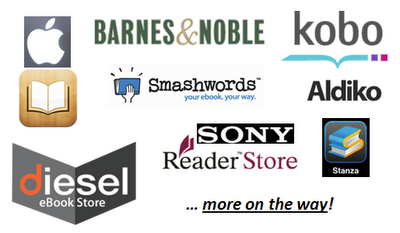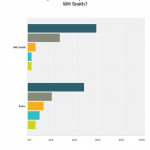-
Vanishing reviews and spreading your risks
October 6, 2011
 Uncategorized
Uncategorized -
This is interesting and currently the hot topic on book blogs: Amazon are removing reviews. Not just in ones or twos, they are emptying entire review accounts. These reviews aren’t abusive or spoilers or anything to do with the content, they are detailed reviews written by bloggers and book reviewers. These are people who run their own blog and cross-post their reviews to Amazon, not the 5-star schemes out there. The current theory on many blogs is that Amazon is removing anything cross-posted to make sure that any reviews on its pages only appear on the Amazon site.
If this is true, this could badly affect indie books including mine, since the majority of my reviews on Amazon are by book reviewers not readers. As I don’t make most of my sales from Amazon, it would be difficult to persuade readers who bought books elsewhere to post their reviews on the site. Other authors are in a similar position:- Amazon is on a Rampage to remove Book Reviews
- Reviews Accidentally Deleted by Amazon or Cover-ups and Denials?
- Amazon denies removal of Reviews and shifts blame
Regardless of the cause, there are a lot of copyright and legal issues involved with this including the actual ownership of the reviews, but other bloggers will cover them in detail. I’d like to focus on the effects of the action, which I believe may have unintended negative side-effects.
One unexpected side effect of this may well be disproportionate damage to small press and indie sellers. While larger publishers can get reviews in mainstream media – television, radio, newspapers – smaller press will use blogs and social media extensively due to a smaller budget overall, and as a greater proportion of their spend. If the reviews are lost in proportion, then a large publisher may lose 10% of it’s reviews, while a small press loses 80% or more. For example Mark Whiteway lost ten reviews in this purge. I’ve lost one – that’s 20% of my Amazon reviews.
The second side effect I can see? Readers going to places like Goodreads to get reader reviews instead of Amazon (it’s where most of my reviews are). Unfortunately for Amazon, Goodreads offers a full selection of places to buy books, so there’s no guarantee customers reading reviews there will then buy from Amazon.
The third issue? Those same book bloggers, authors, and publishers, whose reviews have been lost then removing Amazon affiliate links from their sites. Since many bloggers support their blogs from affiliate links that isn’t a small amount of money. Given the loss of affiliates in some parts of the US due to tax issues, upsetting more does seem like a rather odd business decision.
The fourth, and most disturbing one? An increase in the ethically unsound pay-for-5-stars schemes, where the reviewer has rarely even read the book. Because these five star reviews are not cross-posted anywhere, they aren’t going to be caught by this sweep or removed. The accounts created for these schemes are treated as disposable, so if Amazon blocks one they will just create another. This means fake reviews are safer than reviews from book reviewers, giving small press an unintentional incentive to use these schemes.
However, since Amazon has made the decision it will proceed, even though the reasons behind it are unclear. What can you do as a small press author? Remember Amazon is, when it comes down to it, just one distribution channel – in fact I’d go further: it’s one retailer. If you are selling ebooks, make them available from Barnes and Noble, Sony, Smashwords, Apple etc. In fact you can do all those at once by using Smashwords, who also offer .mobi so you don’t lose the Kindle market.
What can you do as a small press author? Remember Amazon is, when it comes down to it, just one distribution channel – in fact I’d go further: it’s one retailer. If you are selling ebooks, make them available from Barnes and Noble, Sony, Smashwords, Apple etc. In fact you can do all those at once by using Smashwords, who also offer .mobi so you don’t lose the Kindle market.
Paperbacks? If you have an ISBN there is no reason why you shouldn’t be listed on multiple retailers. If you can get a distribution listing – through Ingrams in the states or Gardners or Bertrams in the UK, or with full distribution through one of their sub-groups – it should show up on multiple online bookstore retail sites. These include Waterstones, Smiths, etc. Shelf space can be harder, but again with a listing on any of those distributors or their linked suppliers, in the worst case scenario you can go into the shop and ask. Reviews? Link them from your website to the book bloggers’ websites. Have a link or widget to display your reader reviews from other sites e.g. Goodreads. Shelfari and Librarything have similar options.
Reviews? Link them from your website to the book bloggers’ websites. Have a link or widget to display your reader reviews from other sites e.g. Goodreads. Shelfari and Librarything have similar options.
It is a basic business lesson: over-reliance on one channel to market is unwise, no matter how large they are. Amazon needs to be one of the arrows in your quiver, not your bowstring.
In business-speak I could go on about Single Points of Failure, Theory of Constraint etc. Instead I’ll suggest you should consider the question “If Amazon disappeared tomorrow, where would I be?”
If you can prepare for that, then changes like this one cause a lot less stress.
What do you think?




